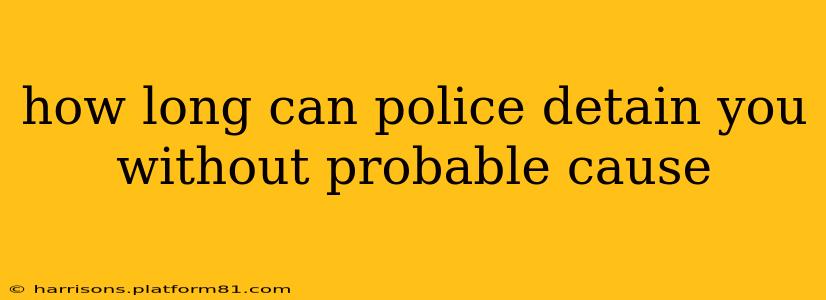How Long Can Police Detain You Without Probable Cause? A Comprehensive Guide
The length of time police can detain you without probable cause is a complex issue, varying significantly depending on several factors. There's no single, universally applicable answer, as legal precedents and specific circumstances play a crucial role. Understanding your rights during a police stop is crucial, and this guide will help clarify the situation.
Understanding the Difference: Detention vs. Arrest
Before delving into the specifics, it's crucial to understand the distinction between detention and arrest. A detention is a temporary, brief restriction of your freedom of movement. An arrest, on the other hand, is a more formal process involving taking someone into custody and formally charging them with a crime. The legal standards for each are different. Probable cause is typically required for an arrest, whereas detention can occur under less stringent circumstances.
Reasonable Suspicion and Terry Stops
In many jurisdictions, police officers can briefly detain you based on reasonable suspicion. This standard, lower than probable cause, allows officers to conduct a Terry Stop, named after the landmark Supreme Court case Terry v. Ohio. A Terry Stop allows officers to briefly detain an individual for questioning if they have a reasonable suspicion that the person is involved in criminal activity. This suspicion must be based on articulable facts, not just a hunch.
How Long Can a Terry Stop Last?
The length of a Terry Stop is limited. It must be brief and only last as long as it takes to resolve the reasonable suspicion. This timeframe is highly context-dependent. If the officer quickly determines there's no criminal activity, the detention should end immediately. However, if the officer needs to investigate further, such as by running a warrant check or questioning witnesses, the stop can last a bit longer, but still within a reasonable timeframe. Prolonged detention without developing probable cause would likely be deemed unlawful.
Factors Affecting Detention Length
Several factors influence how long a detention can legally occur without probable cause:
- The nature of the suspected crime: More serious crimes might justify a slightly longer detention while investigating. However, this doesn't negate the need for eventual probable cause or a shift to a formal arrest.
- The information available to the officer: If the officer receives new information justifying a continued detention, that might extend the timeframe, but it's crucial the information is credible and timely.
- The cooperation of the detained individual: If an individual is cooperative, the detention might be shorter. However, lack of cooperation doesn’t justify indefinite detention without probable cause.
- Jurisdictional variations: Laws and court precedents vary by state and even locality, leading to variations in the interpretation and application of "reasonable suspicion" and permissible detention times.
What to Do if You Believe Your Detention is Unlawful
If you believe you're being unlawfully detained, you have rights. Remain calm and polite, but firmly assert your rights. You have the right to remain silent and to ask for a lawyer. Document the incident, including the time, location, officers involved, and details of the interaction. Consider seeking legal advice as soon as possible following the incident.
H2: What constitutes probable cause for arrest?
Probable cause exists when there is a reasonable belief, based on articulable facts, that a crime has been committed and that the individual being arrested committed it. This isn't a certainty, but a reasonable belief based on the totality of the circumstances.
H2: Can police detain me for questioning even if they don't have probable cause?
Yes, police can detain you for questioning based on reasonable suspicion, which is a lower standard than probable cause. This is commonly seen in Terry Stops. However, the detention must be brief and only last as long as is necessary to address the reasonable suspicion.
H2: How long is too long for a police detention without probable cause?
There's no magic number. The legality of a detention without probable cause depends on the specific circumstances, including the level of reasonable suspicion, the nature of the investigation, and the actions of the police and the individual. Excessively long detentions without developing probable cause are illegal.
H2: What are my rights if I'm detained by the police?
You have the right to remain silent, the right to an attorney, and the right to be free from unreasonable searches and seizures. If you believe your detention is unlawful, calmly but firmly assert your rights and document the incident.
Disclaimer: This information is for educational purposes only and should not be considered legal advice. If you have questions about your rights during a police encounter, consult with an attorney.
